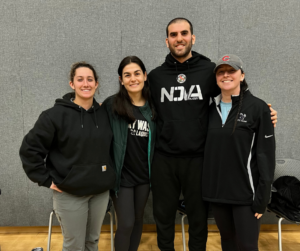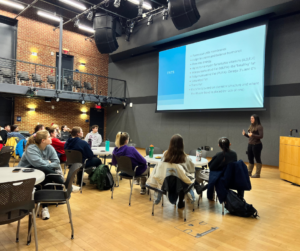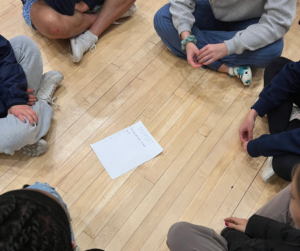When student-athletes sign up to compete at the collegiate level, they have a goal – to play the game and win. All too often, mental health takes a back seat. That’s where Eagles Let’s Talk comes in.

The program aims to help the University of Mary Washington’s more than 525 student-athletes – from soccer and lacrosse players to swimmers and equestrians – identify and discuss stressors that could affect their performance in the classroom or on the field. Spearheaded by UMW Assistant Athletic Trainer Katie Carnaghi, the initiative lays out a full game plan, with monthly meetings, timely topics like nutrition and stress management, and most of all, a safe space for sharing concerns and conversation.
“It really does make such a difference to have an open and safe environment that allows people to feel comfortable to talk about the tough stuff,” said senior Krista Rogers, a volleyball player and Student-Athlete Advisory Committee (SAAC) member who helped get Eagles Let’s Talk off the ground.
Meetings revolve around pertinent topics. A session on nutrition featured a licensed guest speaker who shared tips on body image, healthy calorie consumption and energy levels. Another installment, led by a panel of former athletes including two UMW alumni, helped participants prepare for the struggle to define their identity once they are no longer on the field. The prevalence of suicide in the news and growing statistics – the NCAA reported 38% of those in women’s sports and 22% of those in men’s sports experienced mental exhaustion – led to a session on suicide prevention. “That is a huge number,” Carnaghi said. “That should never happen.”

The 35 student-athletes who turned out for the first meeting broke into small groups to spark more intimate conversations. Individuals signed in by team, only writing their names if they felt comfortable.
Senior baseball player Xavier Herring started attending after hearing about the program from his athletic trainer, Carnaghi. “One of the greatest takeaways I had from Eagles Let’s Talk was that student-athletes are still students and people,” he said. “We are more than just our performance on the field.”
Macey Wissell, a women’s soccer player and an officer of SAAC at UMW favored a session on injuries, where she gained a deeper realization that athletes experience circumstances affecting mental health differently than non-athletes. “You run into not only competing with your teammates for playing time, but also competing against your inner dialogue, working to build self-esteem,” Wissell said.
Mental health awareness for student-athletes hits close to home for Carnaghi, a former soccer player herself who felt she lost a sense of identity when she was injured and couldn’t throw herself into her sport. “It’s OK not to be OK,” she said.

She was inspired by a similar initiative at James Madison University, where she completed her graduate athletic training program. She launched Eagles Let’s Talk in October 2022, just two months after taking her position at UMW. She hopes to grow the initiative, including a shift toward bi-weekly meetings and a more student-run atmosphere, and a push to bring in more resources, connecting athletes to sports psychologists, former athletes and others who can serve as guest speakers.
Carnaghi’s pride in the program is palpable.
“In this area in particular, being so close to a hospital, being a big part of the town, it could benefit a lot of people,” she said. “It’s a big step in athletics.”
If you want to be a part of the Eagles Let’s Talk initiative, please contact Associate Athletic Director Caitlin Moore in the UMW Athletics Department. If you are a student seeking mental health support, the Talley Center for Counseling Services has online resources, contact information and 24/7 support thanks to a telehealth partner. Employees can access the Employee Assistance Program at any time.
Go Katie! Love her work, commitment and pride in UMW. A baseball team Mom #15